The Angola Three's long struggle for justice

The campaign to free the Angola Three reaches Washington, DC on 6 April. Albert Woodfox and Herman Wallace are the remaining two of the trio who are still locked up in solitary confinement. Later this month, 17 April will mark the 39th anniversary of the start of their nightmare. The campaign hits Capitol Hill not before time, as this summer Woodfox will appear in court for the last time to appeal against his conviction.
Congressman Cedric Richmond is to host a screening of a documentary, In the Land of the Free, directed by Vadim Jean and narrated by Samuel L Jackson, which brings to life the case – and the brutal day-to-day reality of Woodfox and Wallace's prison conditions. And Congressmen John Conyers and Bobby Scott will precede the documentary with a briefing on the horrors of solitary confinement. The one freed member of the Angola Three, Robert H King, will also speak. He was freed in 2001.
As members of the Black Panther party, they claim they were framed for the murder of prison guard Brent Miller in 1972. At the time, the three were organising politically against the brutalities of life in Angola prison, in the state of Louisiana. The Black Panther party was a militant political organisation that combined progressive social programmes in support of African American communities with a confrontational attitude towards the state. FBI boss J Edgar Hoover characterised them "the greatest threat to the internal security of the country".
Angola had been the site of a slave plantation before the Jim Crow era, and despite the civil rights campaigns of the 1950s and 60s, nothing much had changed by the 1970s when the Angola 3 were incarcerated. Angola was still segregated, just larger than ever.
Prior to Miller's death, Woodfox and Wallace, who were serving time for armed robbery, had formed a Black Panther chapter in the prison and were struggling against the regime of the biggest, bloodiest jail in the US. They staged a hunger strike and fought to protect young inmates from rape.
They were convicted of Miller's murder on the hearsay evidence of other prisoners. Evidence that might have proved their innocence, such as a fingerprint left at the scene, was suppressed. In time, even Miller's widow came to believe these men were not responsible for the murder of her husband.
King joined Woodfox and Wallace after he was transferred to Angola from another prison. Despite not even being in the prison at the time of Miller's murder, he was implicated. It was enough that he was a known Black Panther party activist. He spent 31 years in prison, 29 of those in solitary.
King was released after successfully fighting his conviction for murder and pleading guilty to a lesser charge, but Wallace and Woodfox remain in jail. Both men have also contested their convictions: Wallace's was recommended to be overturned by a Louisiana state judicial commissioner in 2006, but the case is still working its way through the appeals system. Woodfox has already had his case overturned twice, but was reconvicted partly on the basis of the transcribed testimony of the key witness in the original trial, Hezekiah Brown, a serial sex offender now deceased.
According to Tory Pegram of the International Coalition to Free the Angola Three, judges in both trials have raised "racial discrimination, prosecutorial misconduct, inadequate defence and suppression of exculpatory evidence" in their summing-up. Each time, the conviction has been reinstated on appeal – the state of Louisiana being the appelant. State Attorney General James "Buddy" Caldwell has called Woodfox "the most dangerous man on the planet", while Angola prison governor Burl Cain has stated on record that he wishes to see Woodfox and Wallace remain in solitary for the rest of their days. Cain has even acknowledged the political nature of Woodfox's solitary, saying he doesn't want Woodfox "walking around in my prison because he'd be organising young new inmates".
In the coming court hearing, Woodfox is challenging his conviction on constitutional grounds, claiming that the foreman of the grand jury that convicted him did not reflect the racial and gender makeup of Louisiana. If that fails, he is almost certainly to remain in prison for the rest of his life. The two have also launched a civil lawsuit on constitutional grounds against the length and severity of their solitary confinement; after a decade, that case is due to be heard in 2011.
King hopes that first Woodfox, then Wallace, win their freedom. But he believes that the problems with US jails run much deeper than the particulars of the Angola Three's case. "This is just the tip of the iceburg," he says.



No comments:
Post a Comment